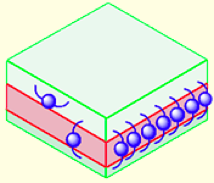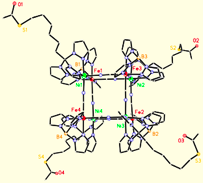The increasing demand for higher information density and circuit miniaturization is rapidly approaching the limits of device scaling technologies, with potential cost and performance limits being realized within a decade. An overarching goal of molecule-based electronics is to insert easily modified molecules that function as switching elements into electronic devices, in principle allowing for information storage at the molecular level. Key challenges of this collaborative research effort [Bruce Hinds, University of Kentucky] are to (1) fabricate nm-scale electrode gaps that correspond to molecular length scales and (2) engineer tunable molecules for study (above). Additional collaborative efforts with Gregory J. Szulczewski (University of Alabama) will investigate the prospect of of molecule-based spintronic and magnetoresistive devices. Recent measurements suggest that we have successfully integrated a series of magnetic clusters into electrical junctions and long range goals of this project will investigate how the clusters and metal ions present tune the electrical transport behavior of assembled devices.



Nanoscale Materials and Devices
Research Projects
Polymerization
Current Funding
NSF CAREER,
CHE 0645414, (2007-2012)
UMSL Start-up (2008-2010)

Selected Publications
“Molecular Electrodes at the Exposed Edge of Metal-Insulator-Metal Trilayer Structures," Tyagi, P.; Li, D.; Holmes, S. M.; Hinds, B. J. J. Am. Chem. Soc. 2007, 128, 4929-4938.
"Ancillary Ligand Functionalization of Cyanide-bridged S = 6 FeIII4NiII4 Complexes for Molecule-Based Electronics," Li, D.; Clérac, R.; Parkin, S.; Wang, G.; Yee, G. T.; Holmes, S. M. Inorg. Chem. 2006, 45, 7569-7571.
"An S = 6 Cyano-bridged Octanuclear FeIII4NiII4Complex that Exhibits Slow Relaxation of the Magnetization," Li, D.; Parkin, S.; Wang, G.; Yee, G. T.; Clérac, R.; Wernsdorfer, E.; Holmes, S. M. J. Am. Chem. Soc. 2006, 128, 4214-4215.
[1]
[2]
[3]

